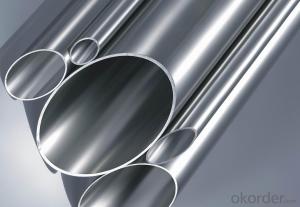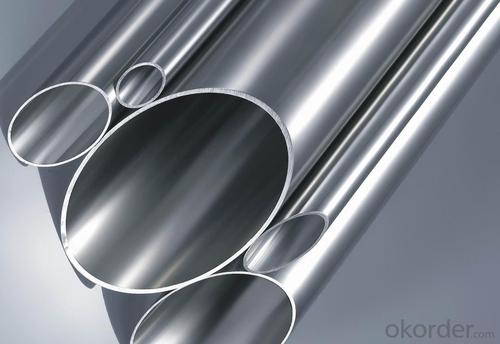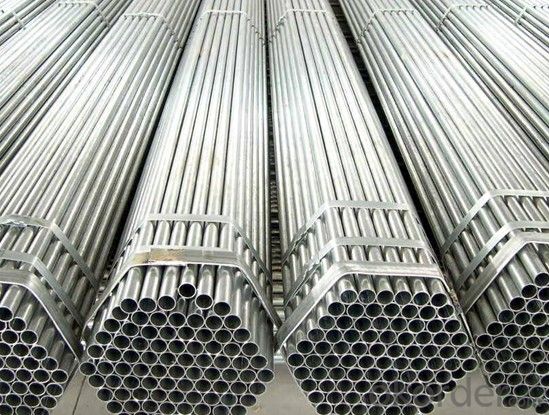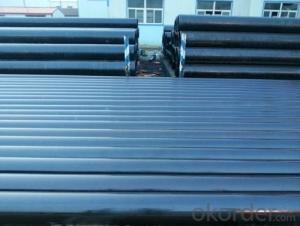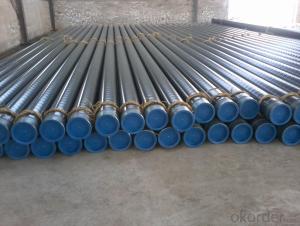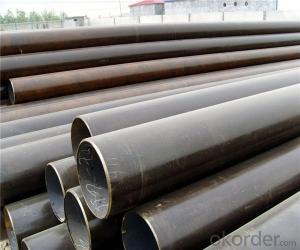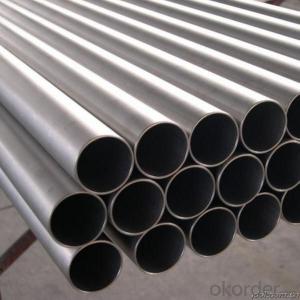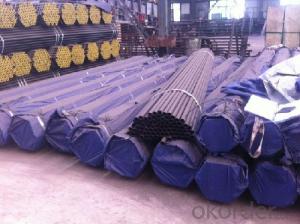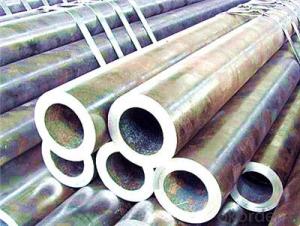Seamless Steel Pipe from China Mainland
- Loading Port:
- Qingdao
- Payment Terms:
- TT OR LC
- Min Order Qty:
- 2000 PCS
- Supply Capability:
- 38000 PCS/month
OKorder Service Pledge
OKorder Financial Service
You Might Also Like
Seamless Steel Pipe from China Mainland Details
| Thickness: | 4 - 100 mm | Section Shape: | Round | Outer Diameter: | 20 - 500 mm |
| Place of Origin: | China (Mainland) | Secondary Or Not: | Non-secondary | Application: | Structure Pipe |
| Technique: | Hot Rolled | Certification: | Other | Surface Treatment: | Other |
| Alloy Or Not: | Is Alloy | Grade: | 10#,20#,45#, 16Mn,10#-45# | Standard: | BS 1387,BS 6323,GB 3087 |
Packaging & Delivery
| Packaging Detail: | wrapped in bundles with steel strips |
| Delivery Detail: | within 35 days |
Seamless Steel Pipe from China Mainland Specifications
Standard | API 5CT, 5L; ASTM, BS, JIS, DIN |
Steel Grade | API 5L Grade B/ASTM A106B, BS 1387 |
O.D. | 27MM-508MM |
W.T. | 4MM-100MM |
Length | 5m--12m |
End protection | plastic caps |
Outside Coating | black painting, anti-corrosion oil, galvanized or as per required by customer |
Production Capacity | Three mills with full production capacity, 400,000tons per year |
Delivery time | 20 days |
Qualification | independent import and export qualifications |
Main market | Asia, India, Middle East, America, Europe |
Seamless Steel Pipe from China Mainland Pictures
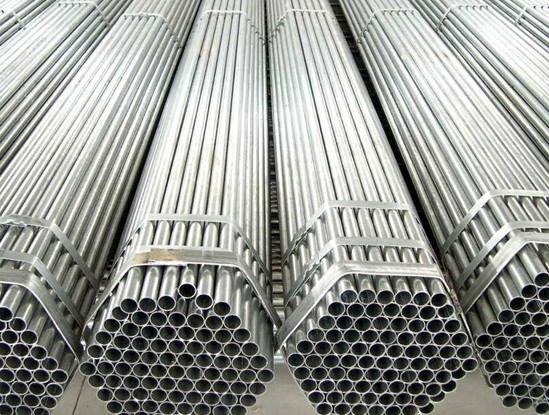
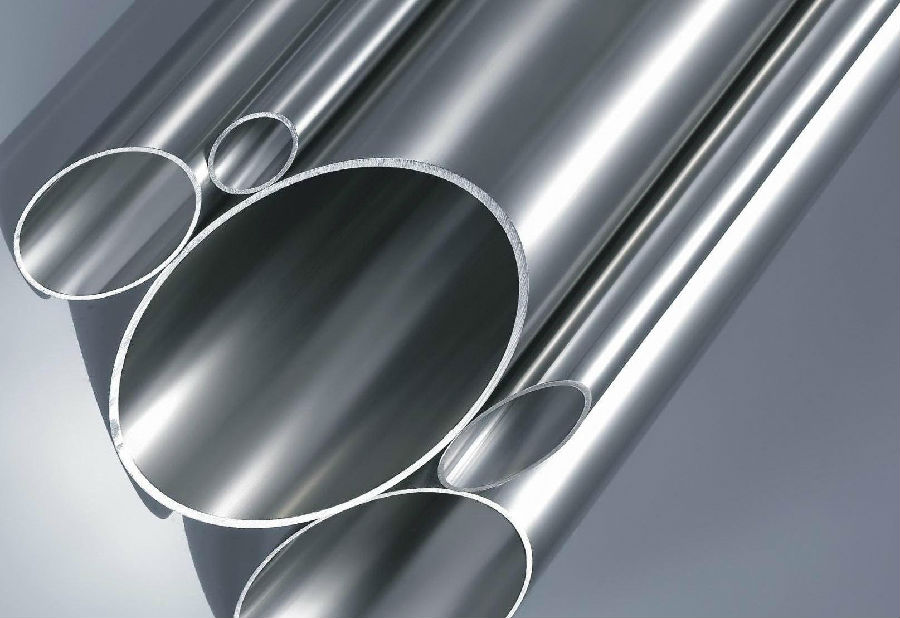
- Q: How are steel pipes used in the construction of stormwater drainage systems?
- Steel pipes are commonly used in the construction of stormwater drainage systems due to their durability and strength. They serve as underground conduits to efficiently transport stormwater away from built-up areas, preventing flooding and water damage. Steel pipes offer high resistance to external pressure and are capable of withstanding heavy loads, making them suitable for underground installations. Additionally, their corrosion-resistant properties ensure long-term effectiveness and minimize maintenance requirements. Overall, steel pipes are essential components in stormwater drainage systems, providing reliable and efficient water management solutions.
- Q: How do you calculate the pipe friction loss for steel pipes?
- To calculate the pipe friction loss for steel pipes, you need to use the Darcy-Weisbach equation. This equation is commonly used in fluid dynamics to determine the pressure drop or friction loss due to the flow of fluid through a pipe. The equation is as follows: ΔP = (f * L * ρ * V²) / (2 * D) Where: ΔP = Pressure drop or friction loss f = Darcy friction factor L = Length of the pipe ρ = Density of the fluid V = Velocity of the fluid D = Diameter of the pipe The Darcy friction factor (f) is a dimensionless value that depends on the Reynolds number (Re) and the relative roughness (ε/D) of the pipe, where ε is the absolute roughness of the pipe. To determine the friction factor, you can use various correlations or Moody's diagram. Once you have the friction factor, you can plug in the values for length, density, velocity, and diameter into the equation to calculate the pressure drop or friction loss. It is important to note that the units of all the variables should be consistent (e.g., length in meters, density in kg/m³, velocity in m/s, diameter in meters) to obtain accurate results. By using this equation and obtaining the necessary parameters, you can calculate the pipe friction loss for steel pipes, which is crucial in designing and analyzing fluid flow systems.
- Q: Are steel pipes suitable for underground drainage systems?
- Yes, steel pipes are suitable for underground drainage systems. Steel pipes have several qualities that make them a popular choice for underground drainage. Firstly, steel pipes are strong and durable, capable of withstanding high pressure and heavy loads. They are resistant to corrosion and can last for many years without the need for frequent maintenance or replacement. Steel pipes also have the advantage of being versatile and adaptable to different soil conditions. They can be easily customized to fit the specific needs of the drainage system, including varying diameters and lengths. Additionally, steel pipes can be welded together, ensuring a tight and secure connection that prevents leakage and the infiltration of groundwater. Another benefit of steel pipes in underground drainage systems is their ability to handle a wide range of temperatures. They are resistant to extreme heat or cold, making them suitable for various climates and environments. However, it is important to note that steel pipes can be more expensive than alternative materials like PVC or HDPE pipes. Additionally, they can be heavier and more difficult to install, requiring specialized equipment and expertise. Overall, steel pipes are a reliable and long-lasting option for underground drainage systems, particularly in areas where durability and strength are important considerations.
- Q: How are steel pipes used in the manufacturing of furniture and appliances?
- Steel pipes are commonly used in the manufacturing of furniture and appliances due to their strength, durability, and versatility. One of the main uses of steel pipes in furniture manufacturing is for constructing the frames or structures of various pieces, such as chairs, tables, and beds. These pipes are often used as the primary support system, providing a sturdy and reliable foundation for the furniture. In appliances, steel pipes are utilized for various purposes. They are commonly employed in the manufacturing of kitchen appliances, such as stoves, ovens, and refrigerators, to create the internal framework and support the weight of the appliance. Steel pipes are also frequently used in the production of washing machines, dryers, and dishwashers to transport water and other fluids throughout the appliance. Furthermore, steel pipes are utilized in the manufacturing of outdoor furniture and equipment, where weather resistance and durability are crucial. These pipes are often coated with protective materials to prevent rust and corrosion, ensuring the longevity of the furniture and appliances. Overall, steel pipes play a vital role in the manufacturing of furniture and appliances, providing the necessary strength and support required for these items. Their versatility allows for various applications, making them an essential component in the production process of these goods.
- Q: Difference and application of seamless hot rolled pipe and cold drawn pipe in seamless steel tube
- The general production of hot-rolled seamless steel pipe in the automatic tube rolling mill. Solid billet after inspection and clearance of surface defects, cut into required length, in the tube hole end surface of centering, then sent to a heating furnace, in punch in punch. While continuing to rotate and advance, in the roll and immediate action, tube gradually form a cavity, called capillary. Sent to the automatic tube rolling mill on rolling. Finally after all the entire thickness, sizing machine sizing, achieve specifications. Using continuous pipe mill production of hot-rolled seamless steel tube is advanced.1.2, in order to obtain smaller size and better quality of seamless tube, cold rolling, cold drawing must be used or combined method of cold rolling. Usually in two roller mill, rolling ring groove tapered plug pipe in variable cross section circular slot and the composition. Drawing is usually in single or double 0.100T chain drawbench.1.3, the extrusion method will soon heat the tube blank in the closed extrusion cylinder, the perforation bar and extrusion rod movement, so that extrusion parts from the smaller die hole extrusion. This method can produce smaller diameter steel pipe
- Q: What is ND steel pipe?
- ND steel 09CrCuSb steel is currently the most ideal "resistance to sulfuric acid dew point corrosion in steel (ND steel, ND steel, 09CrCuSb steel, 09CrCuSb steel), ND steel is widely used in the manufacture of economizer, served in the high sulfur content in flue gas of air preheater, evaporator and heat exchanger equipment for resist sulfur smoke gas dew point corrosion.
- Q: Are metal spiral tubes the same as metal bellows?
- The spiral pipe is mainly used in the pipeline of petroleum and natural gas, and its specifications are indicated by outer diameter * wall thickness.
- Q: What do you mean by "SC" in welded pipe SC200? What's the diameter of 200?
- 200 refers to the diameter of the pipe. Personally, you should be an electrical professional, but the electrical specialty rarely uses the 200 pipe diameter unless it is used when the buried cable passes the road;
- Q: What is the role of steel pipes in the transportation of chemicals?
- The role of steel pipes in the transportation of chemicals is to provide a strong, durable, and corrosion-resistant conduit for safely moving various types of chemicals from one location to another. Steel pipes are known for their high strength and ability to withstand high pressure, making them suitable for handling hazardous or aggressive substances. Additionally, the smooth interior surface of steel pipes minimizes friction, allowing for efficient and continuous flow of chemicals. The steel material is also resistant to chemical reactions, ensuring the integrity and purity of the transported substances. Overall, steel pipes play a crucial role in ensuring the safe and efficient transportation of chemicals, protecting both the environment and human health.
- Q: What is the typical lifespan of steel pipes?
- The typical lifespan of steel pipes can vary depending on various factors such as the quality of the steel, the environment they are exposed to, and the maintenance and care they receive. However, on average, steel pipes can have a lifespan of anywhere between 20 to 100 years or more.
Send your message to us
Seamless Steel Pipe from China Mainland
- Loading Port:
- Qingdao
- Payment Terms:
- TT OR LC
- Min Order Qty:
- 2000 PCS
- Supply Capability:
- 38000 PCS/month
OKorder Service Pledge
OKorder Financial Service
Similar products
Hot products
Hot Searches
Related keywords
